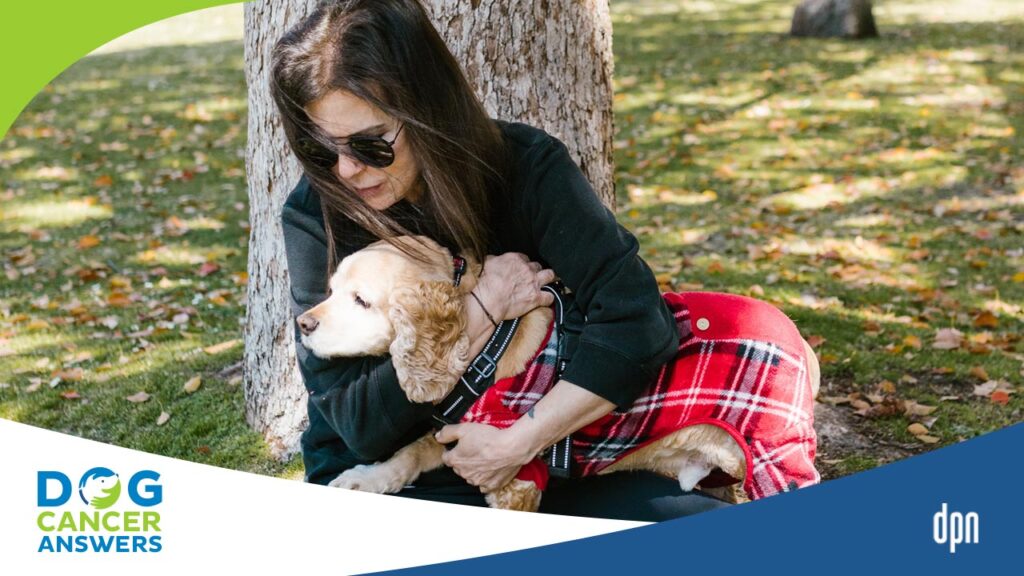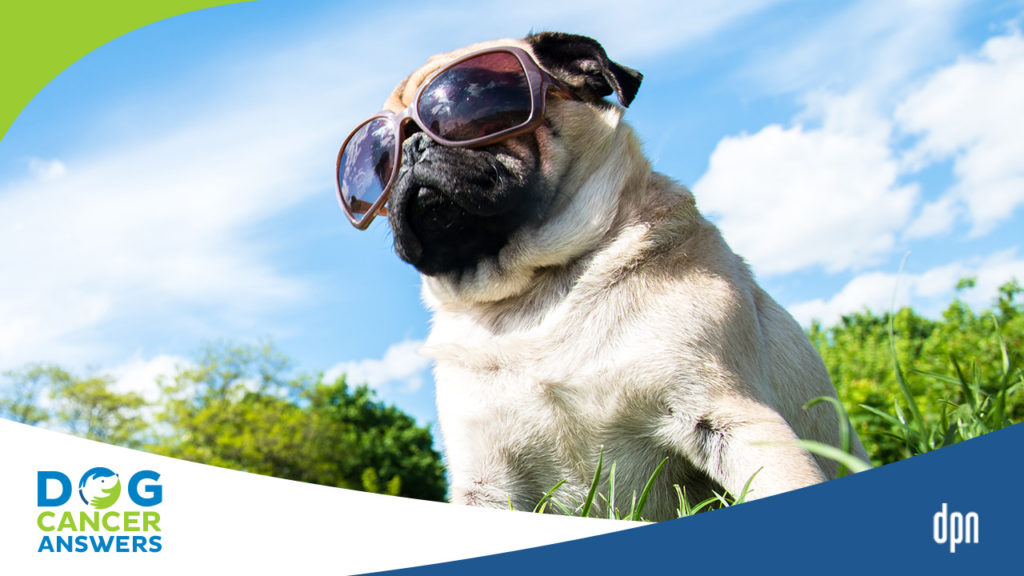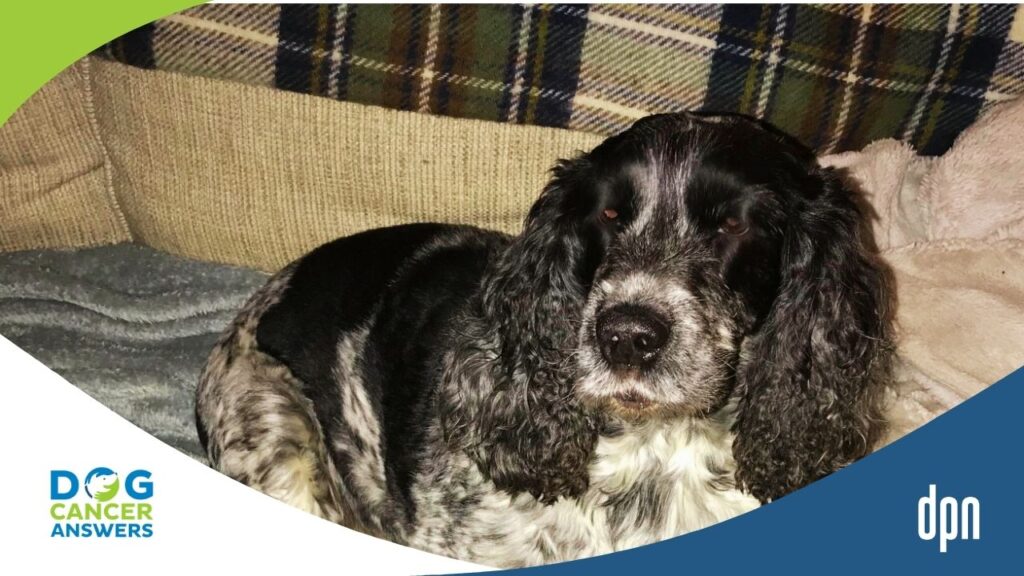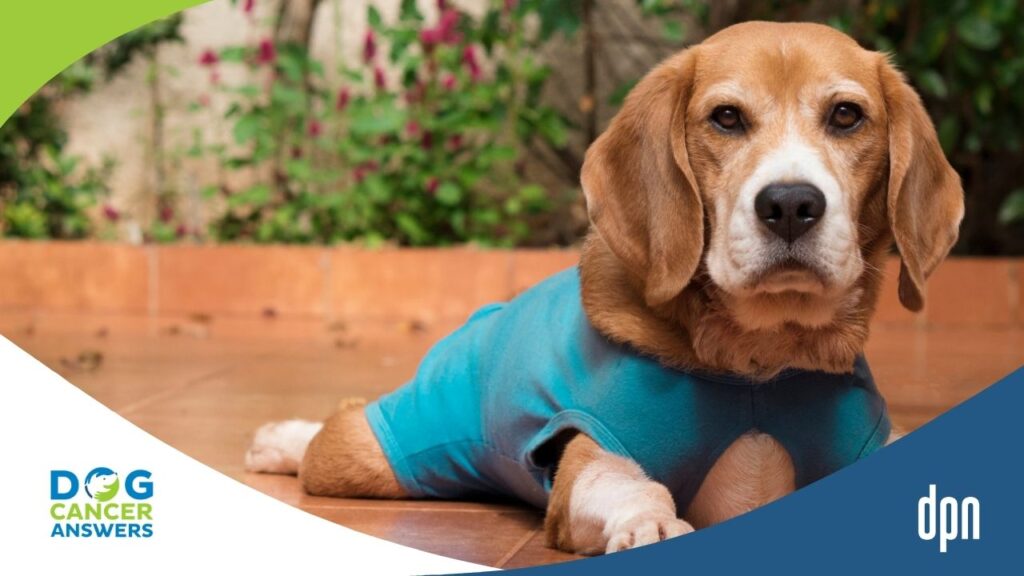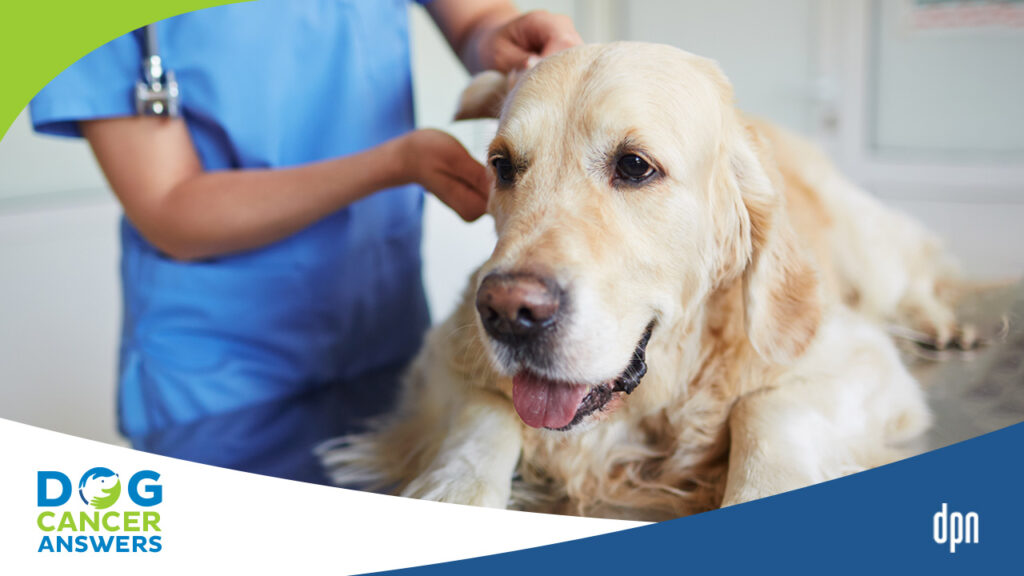[00:00:00] >> James Jacobson: Today on our special Exam Room Series, hemangiosarcoma, and what you need to know to help your dog.
[00:00:07] >> Announcer: Welcome to Dog Cancer Answers, where we help you help your dog with cancer. Here’s your host, James Jacobson.
[00:00:16] >> James Jacobson: Hello friend. Let me start off by saying, I’m sorry. I am sorry that you’re listening to this podcast.
[00:00:23] Sure. I know that it’s an odd thing for a host to say in a welcome message, but the fact that you are listening to my voice now probably means that you have a dog who has been diagnosed with hemangiosarcoma. I’ve been there. And I know what it’s like to have a dog who has cancer. And I also want you to know that you’re in the absolute best place because you’re in good company.
[00:00:45] Unfortunately, cancer is the number one killer of dogs, but there is a lot of hope. Dogs do not have an expiration date stamped on their forehead. There are so many things that you can do to help your dog after you get a hemangiosarcoma diagnosis. Now I’m lucky. My veterinarian is Dr. Demian Dressler, author of the best-selling book, The Dog Cancer Survival Guide.
[00:01:09] He’s a renowned authority on full spectrum approaches to treating dog cancer. And today you can come into his exam room and listen to what he would tell one of his clients whose dog was diagnosed with hemangiosarcoma.
[00:01:21] >> Dr. Damien Dressler: Hemangiosarcoma is a cancer that grows out of the wall of a blood vessel. That’s kind of strange to imagine. And the reason why it doesn’t make a lot of sense is, number one, because it’s a strange concept that we don’t normally hear about. And number two, the way that hemangiosarcoma normally presents itself in dogs, at least the way that’s most significant and life-threatening, is the dog all of a sudden will get very low energy. And if you raise the lip, you’ll see that the gums are no longer pink or no longer than normal color, but are very pale. And sometimes that’s accompanied by loss of appetite and just laying around. And if you look closely, you can see that there’s a big belly. The abdomen is become really swollen.
[00:02:06] That’s the most common life-threatening presentation of hemangiosarcoma of the spleen. The spleen is where this cancer first starts nine times out of 10, at least the malignant version of it. Now, hemangiosarcoma presents itself as bleeding internally. Why is that? Because the tumor itself grows out of the wall of a blood vessel, again, normally in the spleen and then that blood vessel springs a leak, it’s kind of like a hole in the side of a hose.
[00:02:34] And if water is blood, the hole is the inside of the tumor. Tumors are not normal tissue and they tend to fall apart in the middle. So when one of these ruptures, blood goes from inside the blood vessel, out into the dog’s belly and that’s a emergency and we’ve got to get that looked at right away. Now hemangiosarcoma needs to be treated usually surgically, nine times out of 10, by removing the spleen, assuming that it hasn’t spread elsewhere.
[00:03:00] However, there are a lot of things that are overlooked with this tumor type in terms of what you encounter in conventional cancer care. There’s a couple of important things. Sometimes there are other hemangiosarcomas elsewhere in the body that also wants to bleed. The liver would be your most common second area.
[00:03:15] This can be helped or lessened with the addition of a Chinese herb that we talked about in The Dog Cancer Survival Guide called Yunnan Baiyao, and it’s becoming more popular in conventional care. But what this herb does is it helps to limit the growth of spontaneous bleeding. The other thing that’s important to realize is that hemangiosarcoma is not responsive to chemotherapy hardly at all.
[00:03:38] It’s very resistant to the effect of conventional care chemo, drugs. However, there was a very nice study done. It’s a small study, but it seems very good. The use of medicinal mushrooms to help combat, hemangiosarcoma. And it turned out that the use of certain mushrooms or constituents in those mushrooms help to limit the growth of hemangiosarcoma cells in the body.
[00:04:00] And again, we talked about it in the guide, but these are going to be mushrooms like Shiitake and Maitake. And one in particular, the one supplement called I’m-Yunity as being used very commonly right now, as a supplement, that’s useful for hemangiosarcoma. So those are some of the things I think that are commonly overlooked in discussions around hemangiosarcoma care.
[00:04:22] >> James Jacobson: If you’d like to hear more about dog cancer and what you can do to help your dog now, I encourage you to pick up a copy of Dr. Dressler’s book, which just happens to be the sponsor of today’s episode and this entire special Exam Room Series here on Dog Cancer Answers. The name of this best-selling book is The Dog Cancer Survival Guide: Full Spectrum Treatments to Optimize Your Dog’s Life Quality and Longevity..
[00:04:50] The authors are Dr. Demian Dressler, who you just heard from, and Dr. Susan Ettinger, an oncologist in New York. And in a minute, I will tell you how to get their book at a discount. This book is considered the bible of dog cancer, and it covers so much information in an easy to understand, easy to reference guide.
[00:05:09] For example, the book covers everything that you need to know about conventional veterinary treatments, that’s surgery, chemotherapy, and radiation, including how to reduce their side effects. The most effective. non-conventional options, including botanical nutraceuticals, supplements, nutrition, and mind, body medicine, and the book helps you to analyze the options and develop a specific plan for your own dog based on your dog’s type of cancer, your dog’s age, your financial budget and your time constraints as well as your personality. The Dog Cancer Survival Guide is available wherever fine books are sold, both online and in physical bookstores. It’s available either in paperback or as an e-book edition and the e-book is under $10.
[00:05:55] The website to get either the paperback or the e-book is www.DogCancerBook.com. And you will save 10% if you use the promo code PODCAST, when you checkout you’ll save 10%. The website again, www.DogCancerBook.com. Use the promo code PODCAST for 10% off. That is www.DogCancerBook.com.
[00:06:18] I want to let you know that we have lots of free helpful information on our podcast website, the URL is DogCancerAnswers.com. It’s where you can listen to or download our entire back catalog of episodes. It’s the best way to get the information that you need to help optimize your dog’s life quality and longevity.
[00:06:45] Do you have a question for a dog cancer veterinarian? Well, one of our veterinarians could answer your question on a future episode of Dog Cancer Answers. Please call our listener line and record your question. The telephone number is (808) 868-3200. That is (808) 868-3200. Or visit our website at DogCancerAnswers.com.
[00:07:09] With dog cancer, you want to get relevant information as quickly as possible. So make sure you get the next episode of our podcast as soon as it’s released by subscribing to Dog Cancer Answers in Apple Podcast or your favorite podcast app. We’re also on Spotify as well as YouTube.
[00:07:29] That’s all for this episode in our Exam Room Series, I’d like to thank Dr. Demian Dressler for being our guest today. Until next time. I’m James Jacobson from all of us here at Dog Cancer Answers and Dog Podcast Network, I wish you and your dog, a warm, Aloha.
[00:07:50] >> Announcer: Thank you for listening to Dog Cancer Answers. If you’d like to connect, please visit our website at DogCancerAnswers.com, or call our listener line at (808) 868-3200. And here’s a friendly reminder that you probably already know, this podcast is provided for informational and educational purposes only.
[00:08:09] It’s not meant to take the place of the advice you receive from your dog’s veterinarian. Only veterinarians who examine your dog can give you veterinary advice or diagnose your dog’s medical condition. Your reliance on the information you hear on this podcast is solely at your own risk. If your dog has a specific health problem, contact your veterinarian.
[00:08:26] Also, please keep in mind that veterinary information can change rapidly. Therefore, some information may be out of date.



